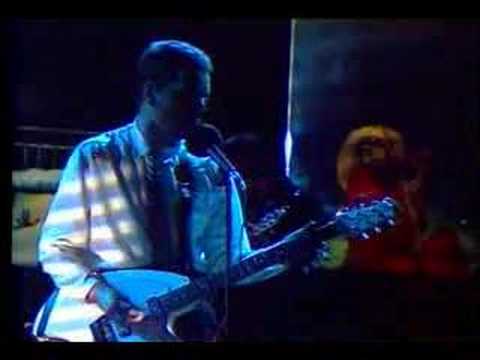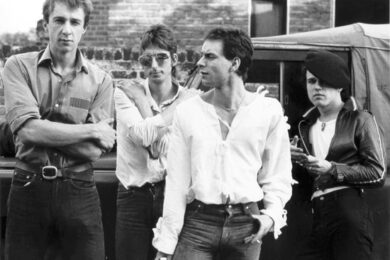In amongst their current run of excellent new albums, Wire have been dropping new editions of esoteric releases from their history ancient and modern. Last year saw both a reissue of their 2003 return, Send, along with The Black Session, a live album taken from the touring dates surrounding Red Barked Tree. Next up is a limited edition CD and DVD of Wire On The Box, the 1979 performance for German TV show Rockpalast. As the clip above (‘Pink Flag’) demonstrates, the programme captures Wire at the peak of their late 70s powers, with tracks from their first three albums Pink Flag, Chairs Missing and 154 sounding tight, fierce and direct.
You can purchase the DVD and CD box set via Pink Flag here. We spoke to Colin Newman to find out more about the history of this unique recording, and why it was so important for Wire when, typically, British television wouldn’t let them near the screen…
"There was a guy called Alan Bangs who worked for British Forces Radio in Germany, which was based in Cologne. In that period he was a bit like the John Peel of Germany, he had the night time show and a lot of Germans would also listen to it. Any band he liked that were playing in Cologne or Dusseldorf would pass through his show, and we would guest on it when we were in the area.
"We were at the Ratinger Hof the night before the performance and got very very drunk with Alan, and then did the TV show the next day. I seem to remember everyone being quite hungover. To the audience it must have seemed like we were aliens, we looked at them and they looked at us like we were from another planet. They looked like German hippies and there was us with our po-faced weirdness, not helped by hangovers!
"The thing that’s really struck me, and the reason for the re-release, is that people know about the Rockpalast thing and have seen it on YouTube, but don’t know that they can buy it. There’s no mega corporations involved, it’s our own label. ‘Heartbeat’ from it gets some interesting reactions on the YouTube page. There are people saying ‘he’s singing like a hobbit’. I’ve also seen ‘these guys were really influenced by Joy Division’ and ‘these guys were really influenced by Primal Scream’. [laughs] YouTube is full of crap. I think a lot of people don’t realise it was recorded in the 70s.
"What’s remarkable about it was that it took a Brit living in Germany to get Wire on the telly. Nobody in Britain would do it at the time. People like the Lippok brothers that went on to form To Rococo Rot were listening to the BFN in East Germany, and we were influential on the Neue Deutsche Welle because Alan was really pushing us. He put us on when the Old Grey Whistle Test wouldn’t have us. They realised they had to put punk on, but we were worse than punk, in their eyes. It took these people in Germany to realise that we should be on the TV, and if it wasn’t for that there’d be no serious visual record of us playing in the 70s. For that, we’re really grateful."
"The most excruciating part of the DVD is the interview that comes with it, that’s just winceworthy in the extreme. In the interests of completeness we thought we’d put the whole thing out as it is. You can tell we’re friends with Alan, but we’re very unformfortable. But the great thing about the whole package is that you can see Wire from the 70s on the TV screen. It was in the WDR archive for years though although there were VHS bootlegs, but then we discovered that as artists you have the legal rights to release it – another company couldn’t, but the artist could. We had to send a solicitor’s letter and we got the rights to it. The original producer was very pleased with how we packaged it.
"We originally released it in 2004 and it quietly did quite well. It’s been out of stock for a few years. We originally did it in two packages, US and UK, the American was in a digipack. I think music DVDs in long boxes look weird. Music should be in square packages, so the re-release is in a square box!
"It hadn’t occurred to us to get hold of it and put it out before. In a way it’s always been more popular with the fans rather than the band. It’s all about perspective: when you’re in a band you hear all the mistakes and think it’s not as good as the studio, where the fan will hear the performance."




